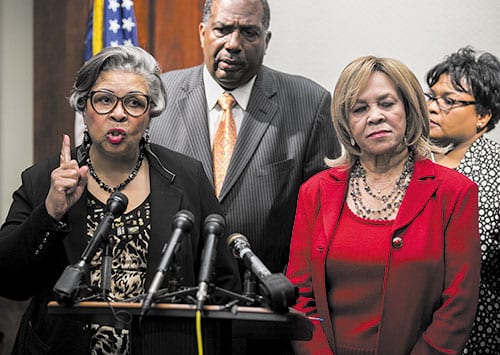“Texas lost” during miserable legislative session for LGBT people

Jessica Shortall
JAMES RUSSELL | Contributing Writer
james.journo@gmail.com
“Texas lost” during miserable legislative session for LGBT people
JAMES RUSSELL | Contributing Writer
james.journo@gmail.com
The 85th Texas legislative session may not end until May 29, but when not calling it one of the worst sessions in recent memory, pundits and political observers are also calling it Lt. Gov. Dan Patrick’s session.
That is because Patrick, a far right, socially conservative Republican heads the 31-member state Senate. And his chamber could not be more different from Speaker of the Texas House Joe Straus’ 150-member chamber. Patrick runs a tight ship, demanding legislators get in line with his agenda. Despite the presence of veteran Democrats like Dallas’ Sen. Royce West, the moderates’ and liberals’ power has diminished since 2015 when Patrick scrapped his chamber’s rule requiring a vote by two thirds of senators to bring legislation to the floor.
With only 11 in their caucus, Democrats have few opportunities to dissent, much less win any battles. In fact, Brownsville Democrat Sen. Eddie Lucio often sides with Republicans on legislation limiting the rights of lesbian, gay, bisexual and transgender issues, allowing anti-LGBT bills in particular to pass.
That’s why many LGBT advocates this session were counting on the 150-member state House and Speaker Joe Straus, a relatively moderate Republican from San Antonio, to kill anti-LGBT bills.
Straus, in contrast to Patrick, lets committee chairs run their processes. Straus is not a flamboyant personality either, another stark contrast to former radio show host Patrick.

State Rep. Senfronia Thompson, D-Houston, left, pictured here with State Sen. Royce West of Dallas, state Rep. Helen Giddings of DeSoto and state Rep. Toni Rose of Dallas at a May 4 press conference about the shooting of Jordan Edwards, this week compared anti-transgender bathroom bills of today to segregated “separate but equal” bathrooms of the past during debate in the House over an amendment to SB 2078. (Jay Janner/Austin American-Statesman via AP)
The so-called “bathroom bill,” SB 6 by Rep. Lois Kolkhorst, R-Brenham, was one of Patrick’s top priorities, even ahead of reforming a foster care system ruled unconstitutional by a federal judge in 2015.
But Straus said before the session even began that the bathroom bill was not a priority in the House. When SB 6 passed in the Senate, Straus buried it in a committee where he knew it wouldn’t gain traction. The House State Affairs Committee did not even give it a hearing. While some legislators — all of them Republicans — supported the measure, Straus’ move let others breathe a sigh of relief.
SB 6 may have not received a hearing in the House but other negative bills did.
Conservative Rep. Ron Simmons, R-Carrollton, managed to get a hearing in the State Affairs Committee on House Bill 2899 which would pre-empt all municipal ordinances protecting LGBT people. It was known as the House’s version of the “bathroom bill.” The hearing went until early in the morning but never reached a vote in the committee.
Other bills did manage to squeak out of the House, however. HB 3859 by Rep. James Frank, R-Wichita Falls, allowing privately-owned foster care and adoption agencies to decline services based on personal religious beliefs and still receive state and federal funds, has been sent to the desk of Gov. Greg Abbott.
SB 2078 by Sen. Larry Taylor, R-Friendswood, concerning hazard and emergency planning for charter and public schools passed in the House with an amendment by Rep. Chris Paddie, R-Marshall, requiring school districts to provide single-stall restrooms, locker rooms and changing facilities to students who don’t want to use facilities designated by “biological sex.” Paddie’s amendment was markedly different from SB 6, which applied to all public facilities and pre-empted any municipal LGBT protections.
During debate in the House on the amendment, Paddie faced criticism from Democratic colleagues, who said the amendment discriminated against transgender students.
“I want to talk to you a little bit about history, because I’ve lived through the separate but equal period,” Rep. Senfronia Thompson, D-Houston, who is black, told the floor in a passionate speech against the amendment. While holding up a photo of a sign reading “RESTROOMS WHITE COLORED,” Thompson said, “I can tell you separate restrooms for transgender kids are also based on fear, not fact.”
But Paddie, who had briefed colleagues on the amendment before filing it, said the amendment was meant to provide guidance on the issue. “It is an effort to provide definitive guidance…for all kids,” he insisted.
He also refuted that it discriminated against transgender students, saying accommodations extend to all students. “It could be because you are transgender or you are shy. It could be because of bullying. This says they will accommodate the child. This is not about a class of children or transgender children,” Paddie said, adding that the language prevents a school from disclosing intimate details about a student.
“For those who care about unfunded mandates, if a school district or open enrollment [faces a lawsuit], it requires the state attorney general to defend them,” Paddie said.
But the arguments were not enough for Democrats.
“The bill is about emergencies and disasters. Where is the disaster?” demanded Rep. Joe Moody, D-El Paso.
After heated debate, and despite early opposition from some Republicans like Dallas’ Jason Villalba, the amendment ultimately passed 91-50, with only one Republican, Rep. Sarah Davis, R-West University Place, voting against it.
The House’s efforts, however, look likely to be all for naught. Taylor, apparently prompted by Patrick, has said he would pull his bill altogether rather than see it pass with Paddie’s amendment attached because the amendment does not go far enough for Patrick and his followers in restricting transgender people’s access to public restrooms.
At the same time, Republicans in the Senate decided to attach the full verbiage of SB 6 — along with SB2, which decreases how much cities and counties can increase property taxes without an election — as amendments to HB 4180, Houston Democratic Rep. Garnet Coleman’s catchall bill that allows counties to continue carrying out certain duties. But Coleman, who adamantly opposes both SB 6 and SB 2, has said the amendments make HB 4180 “dead on arrival.” Like Taylor, he will pull his bill before allowing it to pass with the odious amendments intact.
The same day that the House fought over SB 2078, the Senate on a 21-10 vote passed Frank’s HB 3859, where it awaits Abbott’s signature.
“If an agency is receiving public money, it must serve the entire public. While religious beliefs must be balanced with vital public interests and other parties who do not share those beliefs, this bill goes far beyond reasonable accommodation,” said Sen. Joe Rodriguez, D-El Paso, explaining his vote.
In the previous legislative session in 2015, more than 40 pieces of anti-LGBT legislation were filed. Many were similar to bills filed this session. But none passed. LGBT advocates expected — had hoped for — the same this session.
After the fallout from North Carolina’s HB 2, which pre-empted all local LGBT rights ordinances and restricted bathroom usage based on sex and not gender identity, Texas business leaders, Republicans and clergy all lined up in opposition to similar bills here. The fiscally conservative Texas Association of Business was among the leaders in opposing the Texas bathroom bills, calling them discriminatory and bad for business.
In December, a TAB study revealed the potential economic impact “bathroom” and “religious freedom” bills could have on the state. The report, conducted by researchers at St. Edward’s University in Austin, said that religious freedom bills and “bathroom” bills in the Texas Legislature could cost the state between $964 million to $8.5 billion and lead to the loss of 185,000 jobs.
Tourism officials also came out in force against the discriminatory legislation.
Texas Welcomes All, a coalition of tourism and convention leaders from across Texas, released their own reports, citing evidence of the economic fallout after North Carolina passed sweeping discriminatory legislation. Texas Competes, a group of businesses opposing anti-LGBT legislation, the economic fallout from North Carolina’s similar law totals almost a billion dollars.
Most bills died, like last session. But the strategy this time was simple: get better sponsors.
Rep. Frank, for instance, is respected among his colleagues for being soft-spoken and interested not in shouting matches but legislating. Last session, the author of similar legislation was Rep. Scott Sanford, R-McKinney, who last session voted for former Rep. Scott Turner in his race against Straus for Speaker. Conservative groups saw Straus as too moderate, but Turner lost to Straus by a lopsided vote of 127-19.
But the legislation was also different this time. Frank’s bill requires child welfare groups to provide placements with other agencies within the vicinity. Supporters, such as the Texas Catholic Conference of Bishops, argued this pre-clearance clause prevents children from not being placed with a family at all.
The Texas Association of School Boards, meanwhile, supported Paddie’s so-called bathroom amendment.
After it passed, Texas Association of School Boards praised the respected Marshall Republican’s work.
“The House has approved language intended to be a common-sense solution regarding the use of restrooms and other facilities in public schools,” said TASB
Governmental Relations Associate Executive Director Grover Campbell. “The language captures in law a solution many districts already use locally, seeking a balance between ensuring privacy and security for all students and respecting the dignity of all students.”
But with discriminatory bills now headed to Abbott’s desk, man advocates are wondering what happened.
“It doesn’t matter who wins when your brand is tarnished,” said Jessica Shortall, managing director of Texas Competes. “We received $216 million in negative press because of the bathroom bill.”
It may be too early to measure the negative economic impact of either bill. But Texas is already in uncertain territory thanks to the onslaught of coverage.
“The worst thing in business is uncertainty,” Shortall said.
The overwhelmingly negative response to North Carolina’s bathroom bill had served as a precursor to the outcry against similar Texas legislation. Other states considering such bills have already felt the consequences. Even if Paddie’s amendment receives a boost from school groups, the state’s image has already been tarnished.
If Abbott signs HB 3859, Texas will also be in untested waters.
“There’s no precedent for the child welfare bill,” Shortall said, expecting the backlash will not be as widespread as elsewhere.
But the negative media attention has not helped.
Human relations professionals have already contacted Shortall about the bill, she said, adding, “When a same-sex couple looking to move considers Texas, for instance, they’ll wonder if they are not going to be discriminated against for wanting to start or expand their family.
And in the midst of all the bickering and what-ifs, one thing is clear: “Texas lost,” Shortall said.
…………………
LGBT advocates on the 85th Texas Legislature
From Staff Reports
On Thursday, May 25, a group of LGBTQ and civil rights groups — including the Human Rights Campaign, Equality Texas, the ACLU of Texas, the Texas Freedom Network and the Transgender Education Network of Texas responded to anti-LGBTQ bills under consideration by Texas lawmakers in the waning days of the 85th Texas Legislature.
Bills under consideration include HB 3859, a bill that would allow taxpayer-funded discrimination against LGBTQ prospective adoptive or foster parents as well as allow discrimination against children in foster or adoptive care, and anti-transgender amendments to bills such as SB 2078 and HB 4180.
These proposals are part of a slate of “unconscionable anti-LGBTQ bills being pursued by Texas lawmakers, who are undertaking a systematic effort to roll back the rights of LGBTQ Texans, piece by piece,” advocates said.
“On ‘Discrimination Sunday,’ the state of Texas successfully used fear and misinformation to advance two bills that if signed into law would codify discrimination against all LGBTQ children and adults living in Texas,” said Chuck Smith, CEO of Equality Texas. “SB 2078 allows for continued discrimination against transgender students with regard to restroom facilities and HB 3859 allows faith-based child welfare providers to use taxpayer money to refuse service to LGBTQ people, single women and men, Jews, and Muslims. These bills are unjust, unnecessary, and they will ultimately endanger the lives of LGBTQ children and adults. Targeting some of the most vulnerable children in our state is abhorrent, shameful, and disgraceful.”
Marty Rouse, national field director of the Human Rights Campaign, added, “Quite simply, the legislature is putting politics before people. Texas has undertaken an unprecedented ‘Slate of Hate’ this legislative session. … Texas lawmakers must focus on the best interests of all Texans instead of attempting to win cheap political points by targeting LGBTQ people.”
Rebecca L. Robertson, legal and policy director for the ACLU of Texas, criticized lawmakers for having “relentlessly pursued a cynical agenda that targets immigrants, women, and lesbian, gay and transgender Texans for discrimination,” noting that their efforts have been ongoing “since they gaveled the session open in January.”
“With underfunded schools, a failing child welfare system and a shocking spike in maternal mortality, our lawmakers chose time and again to put politics ahead of the public good,” Robertson added. “Unless the governor acts, this divisive session will be remembered for relegating many of the most vulnerable in our state to permanent second-class status under the law.”
Kathy Miller, president of the Texas Freedom Network, said this legislative session has been “a disaster for civil liberties.”
“Misusing religion to hurt people who are different is not religious freedom, and demonizing people who simply have to use the restroom does nothing to protect anyone’s privacy or safety,” Miller said. “Those are only cynical justifications for allowing discrimination against people because of who they are or whom they love.
“What makes all of this even more tragic is that children are among those who will be hurt the most by these bills,” she added. “Texas needs a legislature that cares more about those children and everyone’s civil liberties than it does the demands of bullies who want to write discrimination into law.”
Lauryn Farris with Transgender Education Network of Texas, said, “We find it abhorrent that the 85th Legislature negatively targets some of the most vulnerable and loved people in our communities, our school children. Empathy begins when we begin to talk to our neighbors and friends, not when we create fear and seek solutions for non-existent issues. The lawmakers who represent the state of Texas swore to work for all of us.”
This article appeared in the Dallas Voice print edition May 26, 2017.

